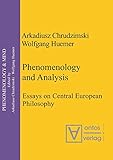Phenomenology & Analysis : Essays in Central European Philosophy / ed. by Arkadiusz Chrudzimski, Wolfgang Huemer.
Material type: TextSeries: Phenomenology & Mind ; 1Publisher: Berlin ; Boston : De Gruyter, [2013]Copyright date: ©2004Description: 1 online resource (381 p.) : Num. figsContent type:
TextSeries: Phenomenology & Mind ; 1Publisher: Berlin ; Boston : De Gruyter, [2013]Copyright date: ©2004Description: 1 online resource (381 p.) : Num. figsContent type: - 9783110332742
- 9783110332841
- 142/.7 22
- B791 .P42 2004eb
- online - DeGruyter
- Issued also in print.
| Item type | Current library | Call number | URL | Status | Notes | Barcode | |
|---|---|---|---|---|---|---|---|
 eBook
eBook
|
Biblioteca "Angelicum" Pont. Univ. S.Tommaso d'Aquino Nuvola online | online - DeGruyter (Browse shelf(Opens below)) | Online access | Not for loan (Accesso limitato) | Accesso per gli utenti autorizzati / Access for authorized users | (dgr)9783110332841 |
Browsing Biblioteca "Angelicum" Pont. Univ. S.Tommaso d'Aquino shelves, Shelving location: Nuvola online Close shelf browser (Hides shelf browser)
Frontmatter -- Table of Contents -- Introduction -- Open and Closed Culture: A New Way to Divide Austrians -- Austria and the Rise of Scientific Philosophy -- Bolzanos bleibende Leistungen -- Bolzano and Husserl on Singular Existential Statements -- Die Geburt der Gegenstandstheorie aus einem Missverständnis? -- Meinong und Supervaluation -- Brentano und die Österreichische Philosophie -- Franz Brentano und die katholische Aristoteles-Rezeption im 19. Jahrhundert -- Husserl’s Critique of Psychologism and his Relation to the Brentano School -- Abstraction and Abstract Concepts: On Husserl’s Philosophy of Arithmetic -- The Quest for the Synthetic A Priori: Husserl and Schlick’s Debate Revisited -- Austrian Theories of Judgment: Bolzano, Brentano, Meinong, and Husserl -- Approaching Brentano’s Theory of Categories -- Assumption and Mechanical Simulation of Hypothetical Reasoning -- Malum, Transcendentalia and Logic -- Contributors -- Index -- Backmatter
restricted access online access with authorization star
http://purl.org/coar/access_right/c_16ec
The history of twentieth century philosophy is characterized by the gap between analytic and continental philosophy - even though both have their roots in a tradition referred to as "Austrian" or "Central-European" philosophy. The essays in this volume show in historical and systematic studies, how a reassessment of this "Central-European" tradition can build an interesting bridge between phenomenology and analytic philosophy and, thus, create a new foundation that allows for an original perspective on central problems of philosophy
Issued also in print.
Mode of access: Internet via World Wide Web.
In English.
Description based on online resource; title from PDF title page (publisher's Web site, viewed 28. Feb 2023)









